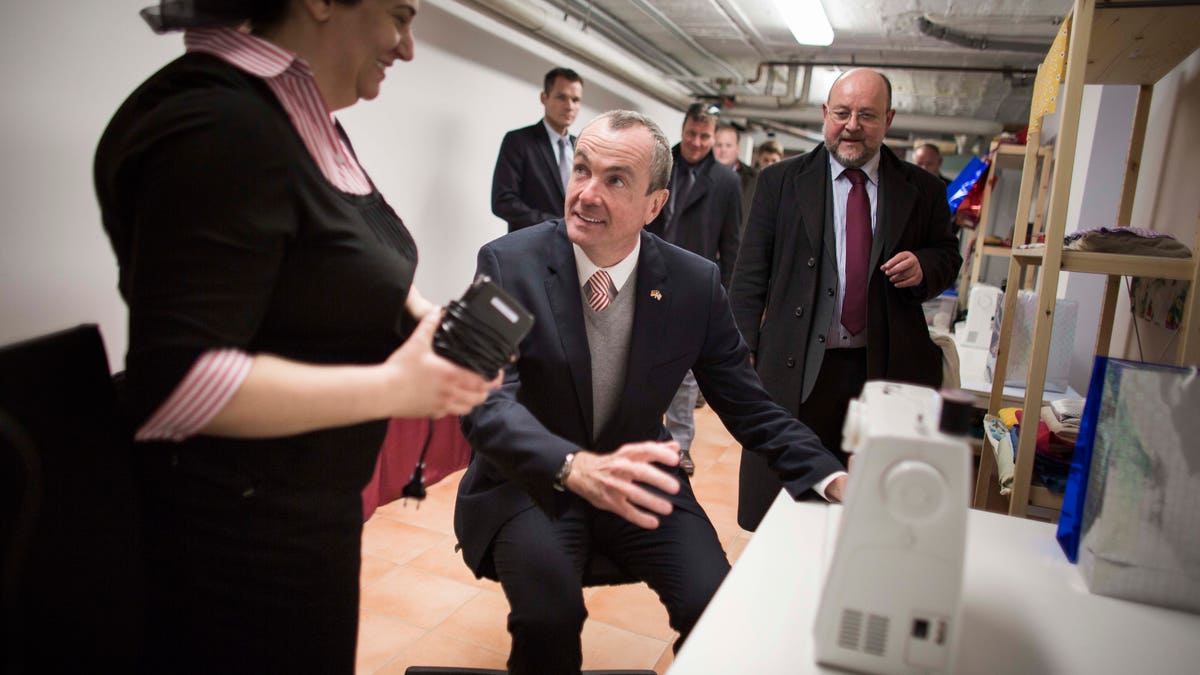
BERLIN, GERMANY - APRIL 08: U.S. Ambassador Philipp Murphy (C) sits in front of a sewing machine in the sewing workshop beside the Director of the project, Benjamin Marx (R), during he visits a Catholic charity housing project home mostly to Roma from Romania and Bulgaria in Harzer Strasse on April 8, 2013, in Berlin, Germany. The Catholic real estate group, called the Aachener Sieldungs- und Wohnungsgesellschaft, bought the complex of buildings with over 100 apartments in 2011, and through the active input of the Roma families living there turned it into a success story of progressive living and immigration policy. The Harzer Strasse facility offers German language classes, urban adaptation and other workshops designed to help the Roma families integrate successfully into life in Germany. Germany, like many countries in western Europe, has experienced a large influx of Roma from Romania and Bulgaria in recent years. (Photo by Carsten Koall/Getty Images) (2013 Getty Images)
A sure sign that a true leader is in charge is when everyone in that workplace knows they will get a fair shake.
One man who specialized in dealing out fair shakes was former U.S. Secretary of Transportation John A. Volpe. The son of Italian immigrants, Volpe had launched his own construction business before beginning his political career and being elected governor of Massachusetts in 1960. During his time as governor, Volpe signed legislation that promoted equality in education, and also expanded public housing for the poor.
In 1968 he made an unsuccessful bid for president, and in January of 1969, the winner, President Richard Nixon, appointed him to head the Department of Transportation. Later that year, Volpe chose Pastora San Juan Cafferty, a native of Cuba, as his Special Assistant.
Cafferty, an instructor at George Washington University, had been a Wall Street Fellow and a Smithsonian Research Fellow before she was selected to be a White House Fellow and Secretary Volpe’s special assistant.
Her time at the Department of Transportation (DOT) taught her a lasting lesson about how a leader fosters change.
The number one person has to set the agenda for change, and has to make it very clear that the markers are measurable, that there’s a timeline and that he is going to keep track of it.
“Volpe used to get together with his immediate deputies for lunch on Saturdays at the Coast Guard mess. The upside of that was the Coast Guard mess had the best food in town – far better than anything at the White House,” Cafferty recalled.
“And one day Volpe said that I ought to join the group for lunch on Saturdays, and I told him that I couldn’t go – they didn’t allow women in the Coast Guard mess. He said that was inappropriate, and he made them change the rule. I was the first woman to ever have access to the Coast Guard mess.”
Volpe was also appalled when he realized that all those working on the upper two floors at the DOT building were white and those working on the lower floors were predominately black.
“He called his assistant secretaries together and he told them that was unacceptable and that he wanted those floors integrated within the year. And you know what? They were integrated within the year,” Cafferty said. “He integrated that department beautifully, it was amazing. I learned a great deal about setting the right tone to change a culture.”
“Secretary Volpe taught me a great deal about leadership in the sense that the number one person has to set the agenda for change, and has to make it very clear that the markers are measurable, that there’s a timeline and that he is going to keep track of it. And once a week in Volpe’s office we went over recruitment and promotion statistics to look at diversity. I learned that if a leader said something had to be done, and then measured it and held people accountable for it, it happened, no matter how difficult it was to do. The DOT was completely segregated when he moved in – in fact, it’s hard to believe how extremely segregated the entire city was at that time.”
Cafferty became a leading scholar on race and ethnicity at the University of Chicago as well as a leader in the Latino community. She received government appointments from four U.S. presidents, an Illinois governor, and three Chicago mayors.
In 1976, at the age of 36, she was invited by Kimberly-Clark to become one of the first Latinas to ever serve on a Fortune 500 board. At the time there were only seven other women sitting on Fortune 500 boards. She later also joined the boards of Harris Financial Corporation, Integrys, Peoples Energy, and Waste Management. Cafferty also was a board member of the Chicago Regional Transportation Authority for many years and sat on non-profit boards such as the Lyric Opera of Chicago and what is now Rush University Medical Center.
It was with great sadness that I learned on April 16th, 2013 that my dear friend Pastora San Juan Cafferty died of non-Hodgkin lymphoma at the age of 72. Colleagues would describe her as fearless in the face of obstacles, and deeply devoted to the needs of others.
Cafferty experienced firsthand that great leaders recognize that talent and leadership abilities are distributed randomly. Therefore, they do not form predisposed judgments about a person based on their ethnicity, gender, religion, age or any other factor. They root out prejudice in themselves and others, and insure that there is an equal opportunity at all levels for everyone to rise to a position of leadership in their organization based on merit and character.
